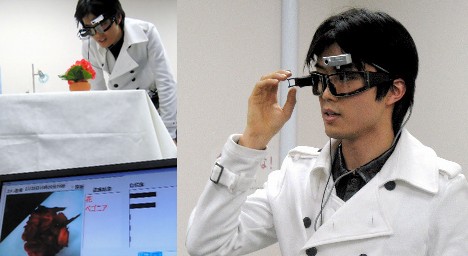
Researchers at the University of Tokyo have developed a smart video goggle system that records everything the wearer looks at, recognizes and assigns names to objects that appear in the video, and creates an easily searchable database of the recorded footage. Designed to function as a high-tech memory aid, these "Cyber Goggles" promise to make the act of losing your keys a thing of the past, according to head researcher professor Tatsuya Harada.
Cyber Goggles are equipped with a compact camera that feeds video to a computer worn on the user's back. The computer records the footage and relies on ultrahigh-speed image recognition processing software to analyze, name and file the objects that appear in the video. Later, when the user types in a keyword to search for a particular item, the corresponding video plays on a tiny LCD screen attached to the right-side lens, helping the user remember the location of the item in question.
In a demonstration at the University of Tokyo last week, 60 everyday items -- including a potted begonia, CD, hammer and cellphone -- were programmed into the Cyber Goggle memory. As the demonstrator walked around the room viewing and recording the various objects, the names of the items appeared on the goggle screen. The demonstrator was then able to do a search for the various items and retrieve the corresponding video.
In addition to functioning as a memory aid for the elderly, Cyber Goggles have a number of other potential uses, says professor Harada. For example, the image recognition processing technology can be used to sift through enormous amounts of video in search of specific images. It might also help in the development of robots with human-like abilities, he says.

